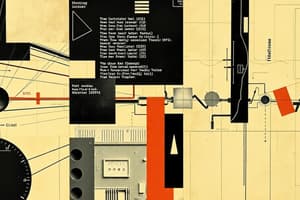Podcast
Questions and Answers
What is the main task of the operating system?
What is the main task of the operating system?
The frugal and efficient allocation and management of available resources.
What does the operating system shield the user from?
What does the operating system shield the user from?
- External factors
- Confusing technical details of the hardware (correct)
- Internet connectivity
- User's application software
The operating system and application software compete for the same hardware resources.
The operating system and application software compete for the same hardware resources.
True (A)
What is a characteristic of early operating systems?
What is a characteristic of early operating systems?
What does 'control is returned to the monitor' mean?
What does 'control is returned to the monitor' mean?
The hardware’s resources are shielded from ______ access.
The hardware’s resources are shielded from ______ access.
What must an operating system frequently do concerning user programs?
What must an operating system frequently do concerning user programs?
Flashcards are hidden until you start studying
Study Notes
Resources and Their Management
- Components of a computer, viewed as resources, require effective allocation and management by the operating system (OS).
- The OS acts as an interface between application programs and hardware, controlling execution and resource distribution.
Operating System as "Shield"
- Users interact with the operating system instead of the hardware, which shields them from complex technical details.
- The OS provides structured functions for hardware access, ensuring safe usage by competent users.
- Key OS responsibilities include:
- Program development support (editors and debuggers)
- Program execution management
- Input/Output device access
- Controlled file access
- Multi-user access handling
- Error detection and response management
- Resource utilization accounting
OS Management Dynamics
- The OS itself competes for hardware resources like the CPU, requiring it to manage its operations effectively.
- The OS must frequently relinquish control to user application software and utilize special hardware mechanisms to regain it.
Evolution of Operating Systems
- Operating systems evolve due to external and internal reasons.
- Evolution path includes:
- Human Operator Phase: No OS; human operators handled computing tasks.
- Serial Processing/Simple Batch Systems: Early OS mimicked human work behavior where each user program had to run entirely before the next could start.
- Monitor Component: Responsible for recognizing program completion and preparing for subsequent jobs in a batch.
Monitor Control and Job Processing
- The resident monitor software stays always in memory to manage jobs.
- The monitor controls job sequencing, facilitating smooth transitions between user and monitor programs.
- The CPU cannot distinguish between executing user software or OS software; it processes both types of instructions.
Memory Management
- Control transitions indicate whether the CPU is executing user or monitor instructions.
- "Control is passed to a job" means the CPU executes instructions from a user program, while "control is returned to the monitor" indicates instructions from the monitor program are executed.
Additional Notes
- Consultation of Section 5.6 in the COS151 Textbook is recommended for a deeper understanding of program execution and monitor roles.
- Further details on the evolution and functioning of operating systems can be found in Section 2.2 of the textbook.
Studying That Suits You
Use AI to generate personalized quizzes and flashcards to suit your learning preferences.




